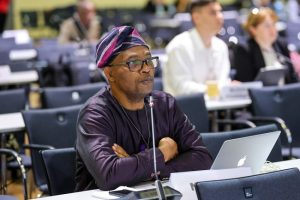Delegates toiled on the first day to provide recommendations from the Intersessional Process (IP) to the Fifth International Conference on Chemicals Management (ICCM5) for a global framework instrument on sustainable management of chemicals and waste.

The new text of the Strategic Approach to International Chemicals Management (SAICM) is being negotiated at the ICCM5 holding in Bonn, Germany.
The delegates managed to reach near consensus on text concerning institutional arrangements, taking stock of progress, revising and updating the framework, and some portions of the section on means of implementation. However, disagreement persisted on vision, scope, financial aspects, and the principles that would guide the framework. Late in the day, delegates turned their discussion to the long list of potential targets and continued working into the night.
In welcoming remarks to plenary, Bettina Hoffmann, State Secretary for Environment, Nature Protection, Nuclear Safety and Consumer Protection, Germany, said she was convinced that achieving sustainable management of the production and use of chemicals requires international cooperation. She urged delegates to work hard over the final two days of the IP to produce meaningful recommendations to ICCM5 for a future global framework.
In plenary, delegations worked on “cleaning” text by removing brackets indicating disagreements in the Co-Chairs’ consolidated document from the resumed IP4 in the sections on introduction, vision, scope, principles and approaches, and strategic objectives. Differences remain on several issues, including whether to generally refer to waste or to “chemicals and their associated waste” throughout the entire document.
A thematic group on institutional arrangements was able to reach consensus in the morning on texts on the International Conference, the Bureau, the Secretariat, taking stock of progress, and revisions and updates of the framework. In the afternoon, they then turned to means of implementation, cleaning remaining brackets in sub-sections on national implementation, international cooperation, and enhanced stakeholder engagement. They then finalised language on the definition as well as process for nominating, selecting, and adopting issues of concern. In the evening, the group began an exchange of views on revisions to a section on implementation programmes.
A thematic group on financial aspects initially floundered through a long debate on which text proposals to use as the basis for negotiation. Two regional groups stressed that the agreed procedure was to use the Co-Chairs’ consolidated text as the basis, given they had prepared a thorough and unified proposal for the consolidated text, while a few other delegations felt the Co-Chairs’ non-paper proposals presented were a more promising basis.
Proceeding based on the consolidated document, the thematic group managed to clean some text in the section on the integrated approach to financing, including on mainstreaming, private sector involvement, and dedicated external financing, but many brackets remain on thorny issues such as private sector liability for pollution.
Besides the ICCM5, the Resumed Fourth Meeting of the Intersessional Process for Considering the Strategic Approach to International Chemicals Management (SAICM) Beyond 2020, and the Regional Meetings, are likewise holding.
“The ICCM5 is expected to agree on a new instrument to succeed SAICM, that will promote global action on chemical hazards. As the 2020 SAICM goal to minimise the adverse effects of chemicals and waste throughout their lifecycle on human health and the environment has yet to be attained, the new instrument is anticipated to be more ambitious and to catalyse a more proactive and timely action to achieve the said goal,” said Leslie Adogame, Executive Director of the Sustainable Research and Action for Environmental Development (SRADev Nigeria).
By Bolanle Simire
